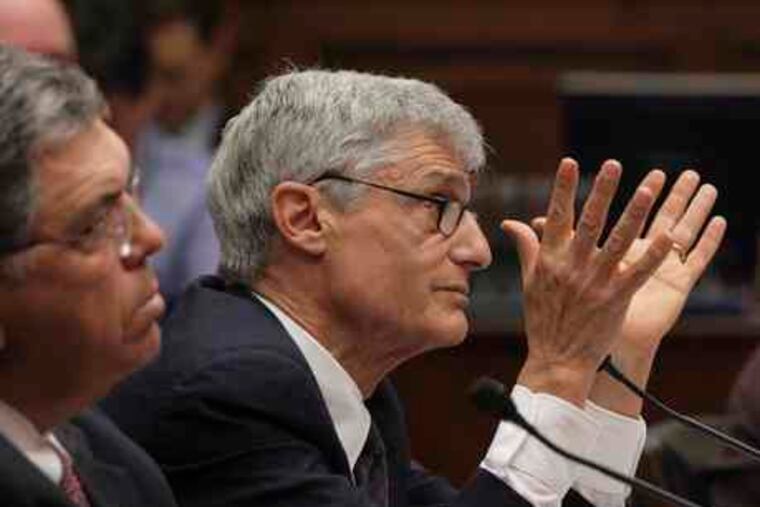PhillyDeals: 'The Big Short' author counsels patience
Michael Lewis parlayed a short career at Salomon Bros. into the comic Wall Street book Liars' Poker and a career as a best-selling writer.

Michael Lewis parlayed a short career at Salomon Bros. into the comic Wall Street book Liars' Poker and a career as a best-selling writer.
At the time, he thought he was exposing Wall Street as absurd, a shallow thieves' market; instead, he was bemused to learn that smart, ambitious finance students saw it as a "How To" book that helped them aspire to high-paid jobs at places like Goldman Sachs.
Twenty-one years later, Lewis' current book, The Big Short, is getting a very different reception. It profiles a handful of outsiders and misfits - the insulting hedge-fund manager Steve Eisman, the one-eyed doctor-turned-data miner Michael Burry - and shows how they made millions for their customers betting against the home-price inflation of the mid-2000s. They also disdained the conventional wisdom of big Wall Street bank bosses and Washington regulators, that prices would keep rising.
On his way to the Free Library of Philadelphia on Thursday to plug his best seller, Lewis told me his book tour shows America as a different country, compared to 1989.
"The popular anger is unbelievable," Lewis said. "It's orders of magnitude different from what I saw with Liars' Poker, in the attitude, in the tone of the crowd, in the level of interest in the details that people have. This is a political force that will not be denied."
What's different? "When I wrote Liars' Poker, nobody seemed to be suffering. Wall Street just went right along growing," he explained. "Now, people are suffering, probably unfairly. . . . If we have another 2,000-point reversal in the stock market, there'll be people in the street with pitchforks."
The morning we spoke, Charles Prince, the deposed Citigroup chief executive, and Robert Rubin, U.S. Treasury secretary-turned-likewise-ex-Citi-
group adviser, were on national TV trying to explain to a Washington committee why, despite their power and the vast talent pools and knowledge networks at their disposal, they failed to grasp what was happening to their bank and the junk loans it marketed, until they needed a federal bailout to survive.
"It's unbelievable what's coming out of their mouths," Lewis told me. "Rubin's a very smart guy. He's saying the multibillion-dollar losses were too trivial to merit his attention and it wasn't his responsibility.
"Prince is saying he had to depend on people lower in the organization. They abdicated responsibility for managing the risk of the institution. That's not management!"
I told Lewis I doubted the government really intended to break up big financial companies, or change the way dealmakers are paid, and the sometimes destructive things they're rewarded for. That's because of the current mixed Congress and the Obama administration's ties to banks and bankers.
"I'm placing a lot of faith in the White House," Lewis insisted.
Even with Rubin acolyte Lawrence Summers as Obama's top economic adviser? "The minute the Democrats lost that Senate seat in Massachusetts, Obama brought [former Federal Reserve chief] Paul Volcker back," Lewis said. "Him, I trust. Volcker completely gets it."
Lewis counseled patience: "The reforms back in the Depression took five years to write. I don't know how long it will take this time. But it has to happen."
It's not that Lewis thinks our politicians have grown wiser or more courageous. It's that the big investment firms that protected "the interest of the few [over] the interest of the many" has been so thoroughly emasculated.
"Anything that comes out of the mouth of Goldman Sachs now is instantly discredited," he said.
They're just not cool anymore? "The brightest kids in the financial industry regard jobs at places like that as a punishment," Lewis explained. "They want to get a job from the new John Paulson [the best-known of the hedge fund managers who sold home-loan bonds short].
"The status of the big firms, in the mind of elite young people, has sunk pretty dramatically."
Lewis saw Liars' Poker as a comedy, and The Big Short as a tragedy. I told him I found The Big Short laugh-out-loud funny in a dark, dark way - in its depiction of big-company bosses unable to grasp what was happening even when their own people were shouting warnings, or unable to turn their companies around quickly. Tiny firms, armed with good information and rapid decision-making skills, profited at the big guys' expense.
"Those big Wall Street firms are awful for all of us," Lewis concluded. "There's no good there."